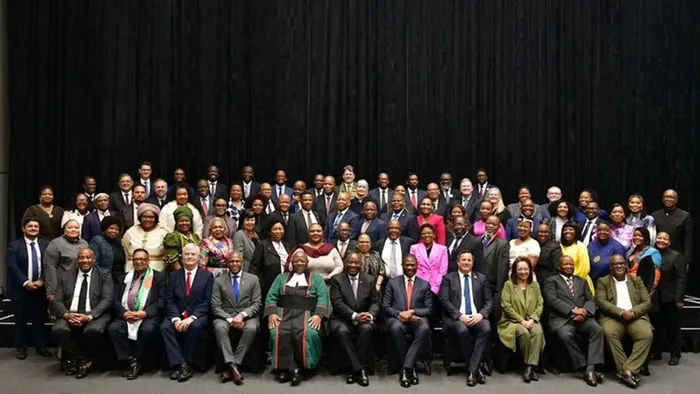One year after landmark 2024 elections, South Africans still waiting for change - GNU stability an illusion

The members of the seventh administration in the Government of National Unity (GNU).
Image: Picture: X / South African Government
May 29, 2025 marks exactly one year since South Africa’s landmark 2024 general elections—an electoral moment that shattered the African National Congress’s post-apartheid dominance and ushered in a new era of coalition politics.
Though the Government of National Unity (GNU) was only formed weeks later, the anniversary of the vote stands as a powerful symbol of shifting political tides in the country and across the continent, analysts say.
Professor Ntsikelelo Breakfast, political analyst and academic, described the 2024 elections as "symbolic and deeply significant," highlighting the end of one-party dominance.
“For the first time, the ANC could not govern alone. That was unprecedented—and unless a major shakeup occurs, I don’t see the ANC recovering its former strength.”
Breakfast links this shift to a broader generational and continental trend.
“The majority of eligible voters are young. Power is moving from rural strongholds to urban centres, and young voters want accountability, not loyalty,” he said.
He cited political shifts in countries like Namibia, Mozambique, and Zimbabwe as signs of a regional transformation.
On whether the GNU has made meaningful progress in its first year, Breakfast strikes a cautious tone.
“It’s still early days. Frankly, I expected the GNU to collapse after the budget rejection—but it has survived, managing internal contradictions for now.”
Yet, he warned that symbolic stability has not translated into substantive delivery.
“There’s competition within the GNU—parties are more interested in branding their wins than delivering results. The DA takes credit when things go right; the ANC is blamed when they go wrong.
“But on the ground, poverty, inequality, and unemployment persist. Economic indicators haven’t improved. People vote to change their lives—not for political theatre.”
Echoing that scepticism, political commentator Professor Sipho Seepe delivered a scathing assessment: The current administration has achieved nothing.
It has proven to be a marriage of inconvenience. The only party that has won is the DA. It has exposed the ANC's political bankruptcy.
“If anything, the ANC is proving to be an embarrassment. At a time when poverty is deepening and unemployment increases, uncontrollably, ANC members spend inordinate amounts of time rallying around an incompetent leader,” he said.
One year on, South Africans are still waiting for tangible improvements in service delivery, infrastructure, and economic opportunity.
The MK Party described the GNU as a failed system, saying service delivery was not possible in many areas.
“Service delivery, a basic expectation of any functioning government, continues to falter under the so-called GNU. Communities across South Africa still grapple with unreliable electricity, inadequate housing and crumbling infrastructure.
“The water crisis in regions like Gauteng and the Eastern Cape underscores the GNU's inability to prioritise the well-being of citizens.
“Healthcare and education systems remain underfunded and inaccessible to the poor, deepening inequalities inherited from apartheid and colonialism,” the party said.
The ANC has not responded to IOL’s calls.
Gauteng residents told IOL that although the government is new, it has tried to improve service delivery, crime and corruption while others differed.
Bethuel Masasa, a resident of Ivory Park, said electricity has become increasingly available though there are load reductions in the area.
“Yes, we have a lot of challenges but things are getting better because we would be without electricity for the longest time. We now have water shortages but I hope it will come alright,” he said.
Getty Mafafa, also in Ivory Park, said it was still new to judge the GNU because there have been squabbles between the DA and ANC.
The fight between these two parties is not promising that they will succeed in this coalition.
“I mean these people are fighting, the DA is threatening the ANC with many things. The DA is against every policy that the ANC is signing.
“We can’t have it because it is wrong and it is dividing the people,” she said.
IOL Politics
Related Topics:
